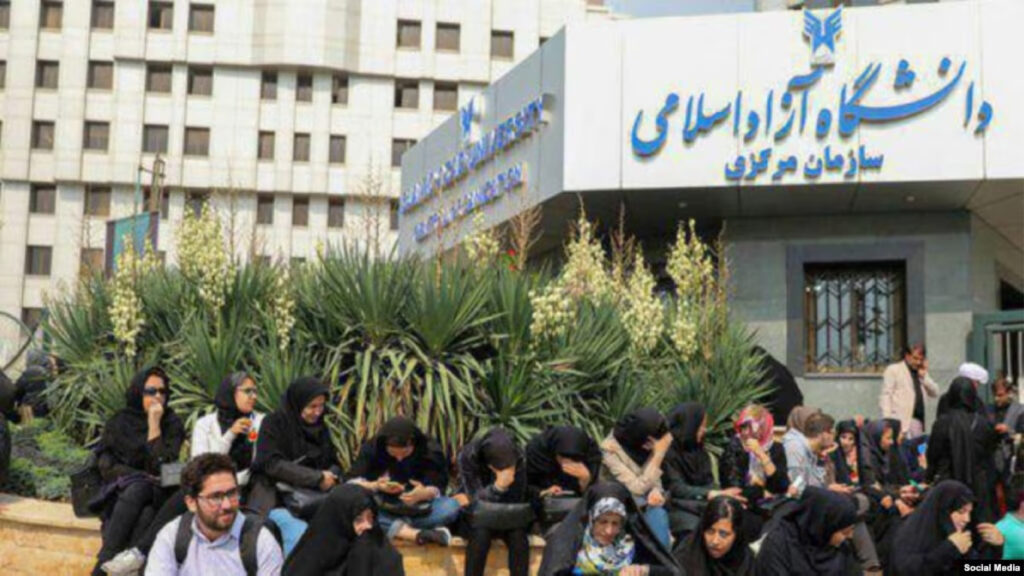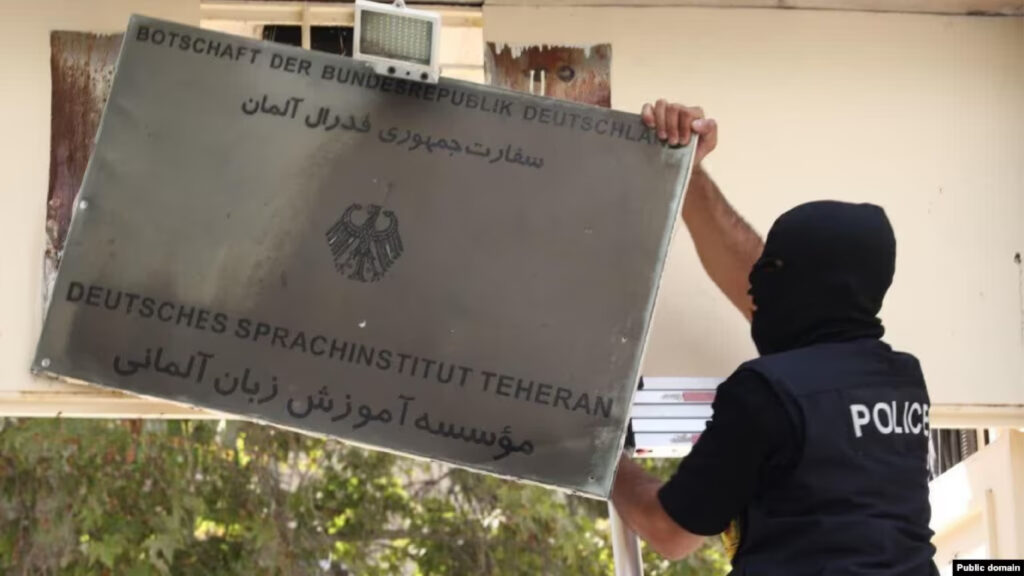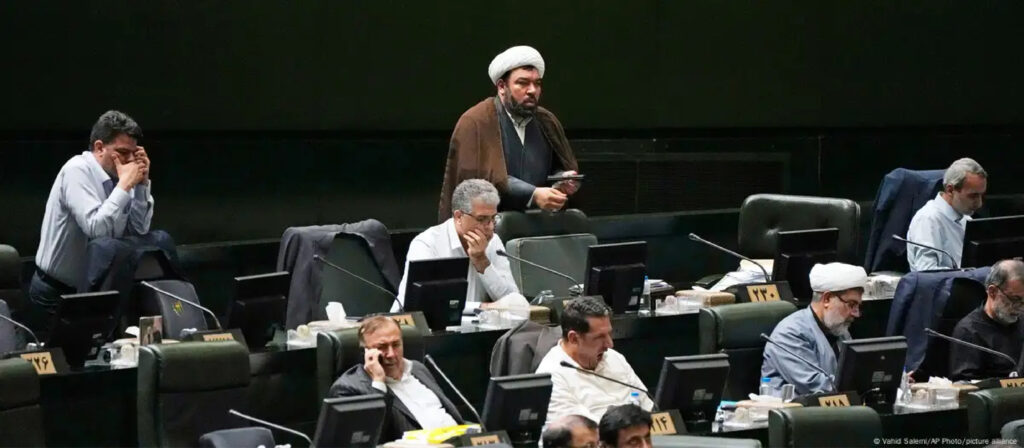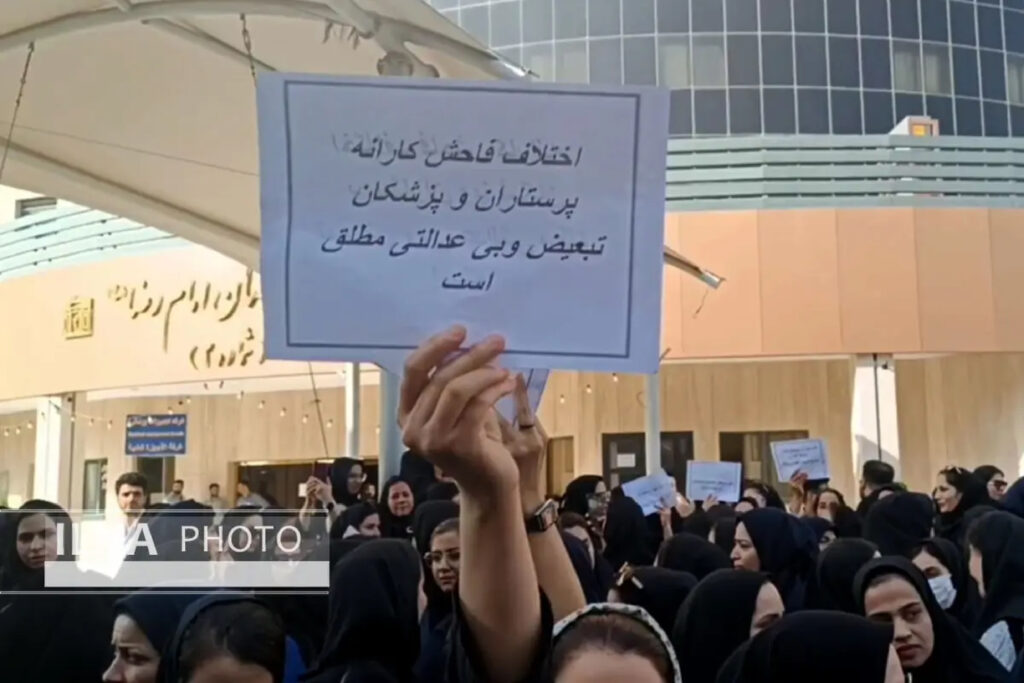
Signs of Wage Earners’ Growing Protests
An editorial in Jahan-e-Sanat discussed the significant economic challenges Iran faced in the 2010s, a period characterized by severe economic downturns and social unrest. The newspaper said that top officials and senior managers of the Iranian republic repeatedly acknowledged that this decade was marked by a drought in investment and a deepening economic crisis. According to the editorial, members of the late President Raisi’s administration emphasized that economic growth during this period was stagnant or even negative, exacerbating the country’s economic woes.
The editorial added that alongside the economic stagnation, the decade witnessed a significant decline in public investment. Inflation rates soared, with 25% inflation in the first half of the decade, rising to 45% in the second half. These high inflation rates further strained the economic situation, placing immense pressure on the Iranian population, particularly wage earners, including factory workers, service sector employees, and retirees. The newspaper noted that these economic conditions contributed to a marked increase in inequality, with the lower-income groups experiencing a declining share of the national income.
The editorial raised the issue of the worsening conditions for wage earners and retirees, who found themselves sinking deeper into economic hardship. The editorial pointed out that small groups of these individuals, including retired workers and nurses, have become increasingly vocal in their dissatisfaction, realizing that the promises made by the 13th government were unfulfilled. Recent labor reports reveal that small but persistent groups of wage earners across various provinces are holding daily protests and gatherings, reflecting their growing frustration.
The editorial further noted that these protests should not be underestimated. It cautioned against dismissing them with the belief that these groups will eventually exhaust their energy and cease their demonstrations. The demands of wage earners and retired workers are clear: they have seen their incomes erode due to inflation, as the growth rate of pensions and wages has lagged behind the inflation rate reported by the Central Bank or the Statistical Center of Iran. This disparity has led to a significant decline in their purchasing power, disrupting the balance between their income and expenses.
The editorial discussed how the actions of the 13th government have placed an additional burden on officials like President Masoud Pezeshkian and the former vice president of Iran, who now faces the challenge of addressing these economic grievances. While the political system has not cracked down on the protests due to the pressing security and foreign policy challenges and the legitimacy of the protestors’ demands, the situation remains precarious.
The editorial further emphasized that the current state of Iran’s economy does not offer a bright future that could persuade the protestors to exercise patience. The newspaper warned that political institutions in Iran are taking a high-risk approach by hoping that these protests will subside on their own without addressing the underlying issues that fuel them.
The Military Exercise in the City of Astara
An editorial in Arman Daily by Alireza Taqavinia discussed the recent announcement by the Iranian navy about an air defense exercise in the northwest region of Iran’s Caspian Sea territory. The editorial said that this exercise, scheduled to take place tomorrow evening in the vicinity of Astara County and the border with Azerbaijan, carries significant implications and messages, which are elaborated below.
The editorial added that Iran has declared this exercise to be defensive, specifically aimed at air defense. This suggests that Iran might be anticipating a threat from the area, with two possible scenarios: either Iran is preparing for a response following a potential missile attack on Israeli bases in Azerbaijan, or military commanders believe that after a future missile strike on Israel, the Israeli regime might retaliate from Azerbaijani territory against Iran.
The editorial noted that the exercise might also serve as a warning to Azerbaijani President Ilham Aliyev and his government, indicating that any involvement in a potential future conflict could make Azerbaijan vulnerable to Iranian military action. It highlighted that Iran has previously imposed serious punitive measures against Baku in the Caspian Sea during the 1970s, though these actions were not widely reported at the time. Aliyev is historically aware of Iran’s resolve and intentions.
The editorial discussed that Iran’s past considerations in dealing with Baku during crises included the historical, cultural, linguistic and religious connections between the Azeri-speaking population in Iran and those in Azerbaijan. However, with the appointment of an Azeri-speaking president in Tehran, it is suggested that it would now be easier for Iran to confront and punish Aliyev if necessary. This change is seen as making potential confrontations more acceptable to the Azeri-speaking people.
The editorial also stated that recent military exercises indicate Iran’s serious and resolute planning for potential punitive actions against Israel, suggesting that these actions are not haphazard but are part of a well-considered strategy with clear objectives.
Brain Drain Extends to Non-scientific Fields
An editorial by Amanollah Ghorai-Moghadam in Arman Melli addressed the growing concern regarding non-scientific professionals, including skilled workers and specialists, migrating from Iran and the implications of this trend. The editorial stated that even technical experts such as welders and HVAC specialists are increasingly seeking opportunities abroad, including in neighboring countries. This shift is part of a broader pattern where not only professionals like doctors and engineers are leaving, but now other types of specialists are also emigrating.
The editorial added that Joseph Schumpeter’s theory, which is central to understanding economic and social development, emphasizes the importance of the social climate for development. According to Schumpeter’s 12th principle, the social environment is a crucial factor in development. The lack of an appropriate social climate in Iran has become a significant driver for the emigration of non-scientific elites. Historically, the migration trend was primarily among doctors and engineers, but now it includes a wider range of skilled professionals. This migration is causing substantial harm to the country, comparable to the damage caused by the emigration of scientific elites.
The editorial noted that development theorists argue that if education and training over a hundred years produce a single elite, the cost of that education is justified by the return on investment, which includes potentially hundreds of billions of tomans. When these trained individuals leave the country, both material and spiritual damage occurs. Despite developing countries being able to acquire advanced technology with their foreign earnings, without the ability to nurture a skilled workforce, they will not achieve economic, political, or cultural growth. As Hegel famously said, no organization or regulation can effectively foster economic, cultural, or political growth unless the people managing it understand what they are doing.
The editorial discussed how both scientific and non-scientific elites are inclined to emigrate due to the current social instability and other issues. The lack of a promising future and the easy loss of national resources are major factors driving this trend. Each professional who emigrates causes damage equivalent to a burning oil well or the depletion of an underground water source. The absence of these skilled professionals affects the country’s ability to conduct research and development in crucial fields.
The editorial further emphasized that the migration of specialists across all fields of expertise is a significant issue that requires urgent attention. It raised the question of who is accountable for this situation and whether anyone in the country fully grasps the depth of the emerging issues. The editorial warned that the alarm about this problem has been ringing for years, and it is crucial for policymakers and society to heed this warning and address the underlying causes of the migration trend.
Fallout From Any Potential Russian Defeat
An editorial by Yadollah Karimipour in Arman Daily delved into the geopolitical ramifications of a potential defeat for Russia in the ongoing Russia-Ukraine war and its implications for regional and global dynamics. The editorial said that the protracted nature of the war, the setbacks experienced by the Russian navy in the Black Sea, and the possible scenarios of President Vladimir Putin’s downfall or assassination have become central themes over the past two years. With a strong emphasis on Russia’s impending defeat and President Putin’s vulnerabilities, the editorial explored several geopolitical dimensions of such a defeat.
The editorial added that one of the primary consequences would be Russia’s loss of influence in the South Caucasus. It is highly likely that competition among Turkey, Europe, the United States, and to a lesser extent China, will intensify as these powers vie to expand their influence in the region. Armenia has already moved away from Russian influence, with France, Greece, the United States, and other European nations increasingly filling the vacuum. Baku is closely aligned with Ankara, while Georgia shows a deep and fundamental inclination towards the European Union and NATO.
The editorial noted that a Russian defeat would undoubtedly open up opportunities for the five major regional players — China, the United States, Turkey, the remaining parts of Russia, and Europe. Each of these countries would seek ways to escape the historical and geographical constraints imposed by Russia. This shift could lead to a reconfiguration of alliances and influence, affecting regional power dynamics and strategies.
The editorial discussed that the role of the Caspian Sea as a corridor for enhancing connections between Central Asia, the Caucasus and the Black Sea (the Eastern-Western corridor) would become more significant. This increased importance of the Caspian region could lead to a more integrated and densely connected area, impacting trade routes and regional cooperation.
The editorial raised the issue that if the Iranian republic maintains its current level of underdevelopment and continues its existing foreign policy strategy, there could be a growing divergence in the sentiments of the population in the northwestern regions of Iran towards Tehran. This could manifest in increased discontent and a stronger regional push for greater autonomy or alignment with other regional powers.
The editorial recommended that the best approach for Iran would be to foster increased regional competition by establishing and strengthening relations with the United States, Europe, Oceania, and East Asia.

Exclusive Report: Academic “Inquisition” – Professors Interrogated, Detained, and Banned from Teaching for Supporting Student Release Statement

In the review of Hussein Simayi-Sarraf’s nomination as minister of science, research and technology, presented to the Iranian Parliament on Tuesday, August 20, no mention was made of the critical issue of university faculty dismissals during the nationwide “Women, Life, Freedom” protests. Despite the extensive wave of political and ideological dismissals and terminations of university professors in recent years, a problem that had sparked dissatisfaction within the academic community and which Masoud Pezeshkian had pledged to address, this issue was not addressed by either the nominee or the supporters and opponents during the session.
Pezeshkian had previously expressed his opposition to the dismissal of professors, suggesting such actions might be personal vendettas. However, the introduction of the latest employment regulations for university faculty and the mass firings have been seen by many as part of a larger project to “purify and Islamize” universities, intensifying since the nationwide protests of 2021. This project has led to the suspension of hundreds of critical professors, including 32,000 adjunct professors from Islamic Azad University.
Behnaz Emami, a former professor at Islamic Azad University, shared in an exclusive interview with Voice of America that she was detained and later expelled from the university for signing a petition calling for the release of students. Emami recounted being interrogated, detained, and later mistreated by university officials, who provided no formal documentation for her dismissal and misled students about the reasons for her arrest, attributing it to an unrelated issue.
Emami, who taught at the Centeral Tehran and Tehran South branches of the university for eight years, noted that during the vetting process, colleagues advised her to avoid wearing makeup and to dress conservatively but not in a chador, as it could raise suspicion based on prior investigations.
Iranian Police Raid Goethe Institute; Judiciary Orders Closure of German Government-linked Centers

Reports from Iran indicate that officers of the Iranian republic’s police force raided and sealed the Goethe Institute, a prominent German language teaching center in Tehran. The judiciary-affiliated news agency Mizan announced on Tuesday, August 20, that two “illegal centers linked to the German government” were shut down by judicial order for “multiple violations of the law and widespread financial misconduct,” without directly mentioning the Goethe Institute.
A post on Mizan’s X (formerly Twitter) account claimed that investigations into other German-linked centers in Iran are ongoing. Social media images showed police vehicles outside the institute on Dibaji Street, with officers removing its entrance sign. Some users reported that the closure occurred during a German language exam.
The Goethe Institute is a non-profit organization dedicated to promoting German language and culture worldwide. Speculation suggests that this closure might be a retaliatory move following the German government’s shutdown of the Islamic Center of Hamburg earlier in August, citing its extremist Islamist agenda. The closure of the Hamburg center, which the German intelligence agency classified as extremist, had previously sparked outrage from Iran’s Foreign Ministry, condemning the action as hostile and a violation of fundamental human rights.
Iranian Parliament Reviews Cabinet Nominees: Focus on Qualifications and Alignment With National Policies

On the fourth day of the Iranian Parliament’s review of Masoud Pezeshkian’s proposed cabinet, the qualifications of several key ministers were scrutinized on Tuesday, August 20. The candidates under review included Mohammad Atabak for minister of industry, mines, and trade; Hossein Simayi Sarraf for minister of science, research, and technology; Eskandar Momeni for minister of interior; and Abbas Salehi for minister of culture and Islamic guidance.
In his speech, Atabak referred to himself as a “soldier of the supreme leader” and outlined his plans to counter the effects of international sanctions. He emphasized that his ministry’s strategies would align with broader national policies, including the Seventh National Development Plan and the country’s 20-year vision document. Atabak faced criticism for his lack of relevant experience, with some pointing out the disconnect between his civil engineering background and the demands of the industry and trade sectors.
Momeni, nominated for the Ministry of Interior, was met with opposition from some MPs, who urged him to adopt cultural and social approaches when addressing social tensions and unrest. Although the exact nature of these “tensions and unrest” was not specified, they likely refer to resistance against mandatory hijab laws, which the regime often labels as “social anomalies.”
Why Did Nurses in Various Provinces Stop Working? A $200 Salary Is Not Even Enough for Our Transportation Costs!

In recent weeks, nurses across Iran have staged widespread protests, highlighting severe dissatisfaction with their working conditions and compensation. The demonstrations, which began in Karaj and spread to other provinces, including Fars and Mashhad, are driven by the stark contrast between nurses’ salaries and the demands of their profession. Iranian nurses earn an average monthly salary of 12 to 15 million tomans (around $200), which is insufficient to cover basic expenses like transportation.
Nurses criticize the healthcare system, which is dominated by physicians, for being out of touch with their struggles. They argue that the Ministry of Health’s leadership, represented largely by well-compensated doctors, fails to understand the challenges faced by nurses, including long hours, delayed overtime payments, and inadequate legal protections.
Despite ongoing protests, the government has largely ignored nurses’ demands. Nurses are calling for fair implementation of laws that regulate nursing services, better compensation, and improved working conditions. The protests have been met with threats and penalties, rather than meaningful dialogue or action. The situation underscores a deepening crisis within Iran’s healthcare system, as many nurses contemplate leaving the profession or even the country due to the dire circumstances.
